Healthcare companies are under constant pressure to deliver high-quality patient care while managing vast amounts of data, complying with regulatory requirements, and adapting to new technologies.
DevOps, a set of practices that combines software development (Dev) and IT operations (Ops), offers significant advantages for healthcare organizations striving to meet these challenges. In this article, we will explore the best practices and benefits of DevOps for healthcare companies.
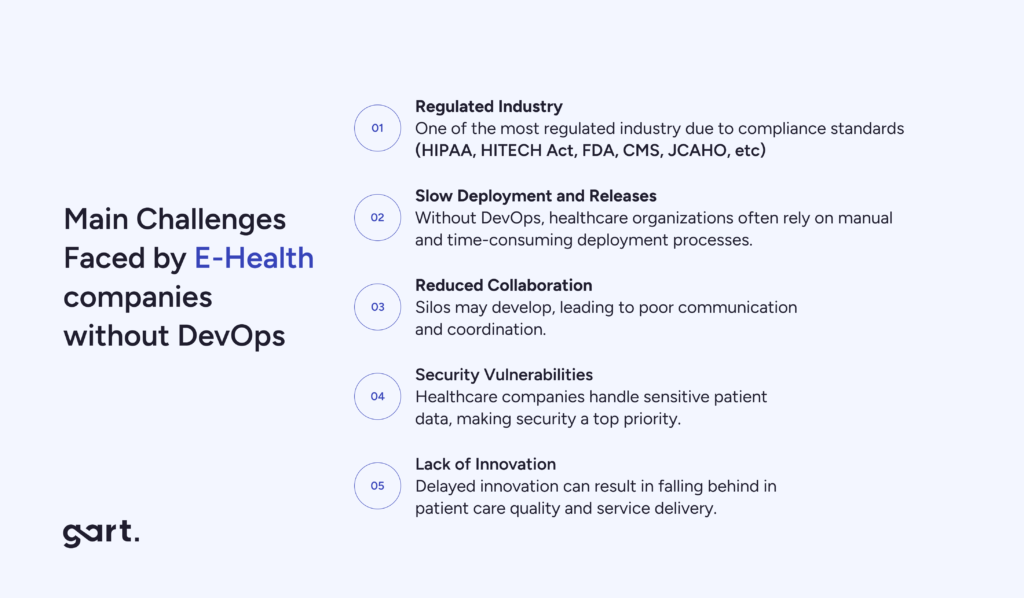
Regulated Industry
One of the most regulated industry due to compliance standards (HIPAA, HITECH Act, FDA, CMS, JCAHO, etc)
| Compliance Standard | Description | Impact on DevOps Practices |
|---|---|---|
| HIPAA | Health Insurance Portability and Accountability Act | Requires strict data security and privacy measures, necessitating encryption, access controls, and audit trails. DevOps practices must ensure compliance at all stages. |
| HITECH Act | Health Information Technology for Economic and Clinical Health Act | Encourages the adoption of electronic health records and sets standards for data breach notification. DevOps practices need to secure electronic health records and establish efficient breach response procedures. |
| FDA | Food and Drug Administration | Enforces regulations on the development and deployment of medical devices and pharmaceutical software. DevOps in healthcare must adhere to rigorous compliance checks, documentation, and validation. |
| CMS | Centers for Medicare & Medicaid Services | Regulates healthcare payment and service delivery. DevOps practices must align with regulations to ensure efficient billing, payments, and service quality. |
| JCAHO | Joint Commission on Accreditation of Healthcare Organizations | Provides accreditation for healthcare organizations. DevOps practices play a role in meeting accreditation standards related to patient safety, care quality, and data security. |
| GDPR | General Data Protection Regulation (EU) | Applies to healthcare organizations that handle EU patient data. DevOps practices must include data protection and consent mechanisms to comply with GDPR requirements. |
Specific DevOps Practices Tailored for the Healthcare Industry
HIPAA Compliance
Healthcare organizations deal with sensitive patient data subject to the Health Insurance Portability and Accountability Act (HIPAA). DevOps teams must prioritize HIPAA compliance by implementing encryption, access controls, and audit trails in their pipelines.
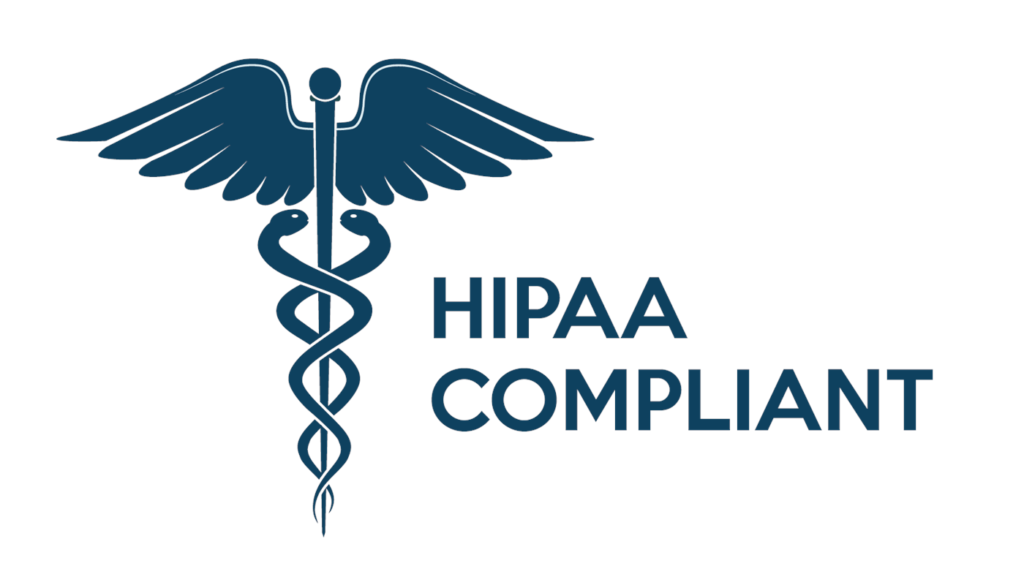
Automated Testing for Regulatory Compliance
Healthcare applications often need to adhere to strict regulatory standards. Automated testing should include compliance checks to ensure that software meets healthcare-specific regulations and standards.
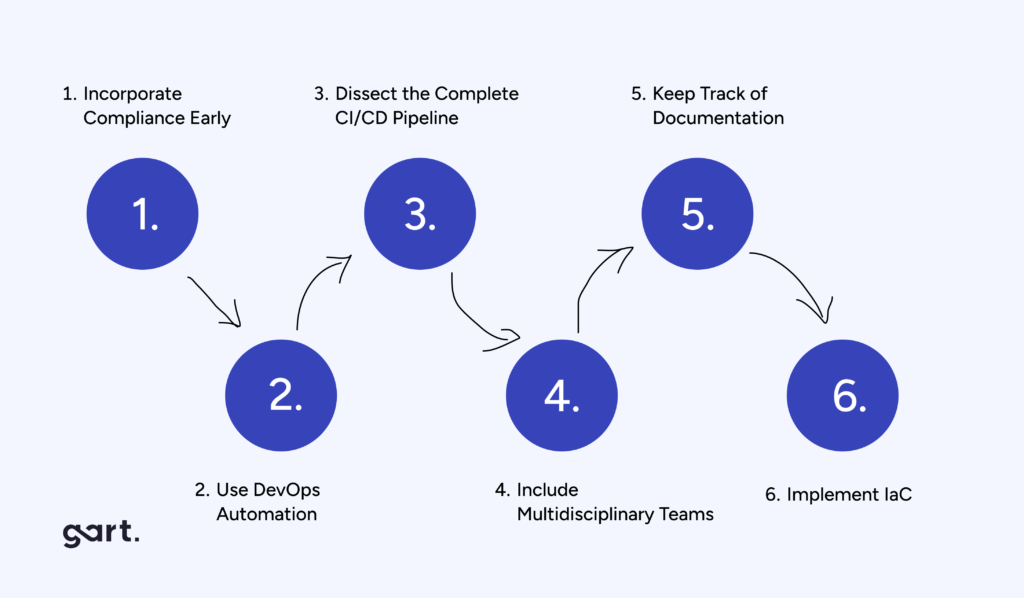
Patient Data Security – Encryption & Data Masking
Protecting patient data is a top priority. DevOps should focus on securing data at rest and in transit, and implementing robust identity and access management (IAM) practices.
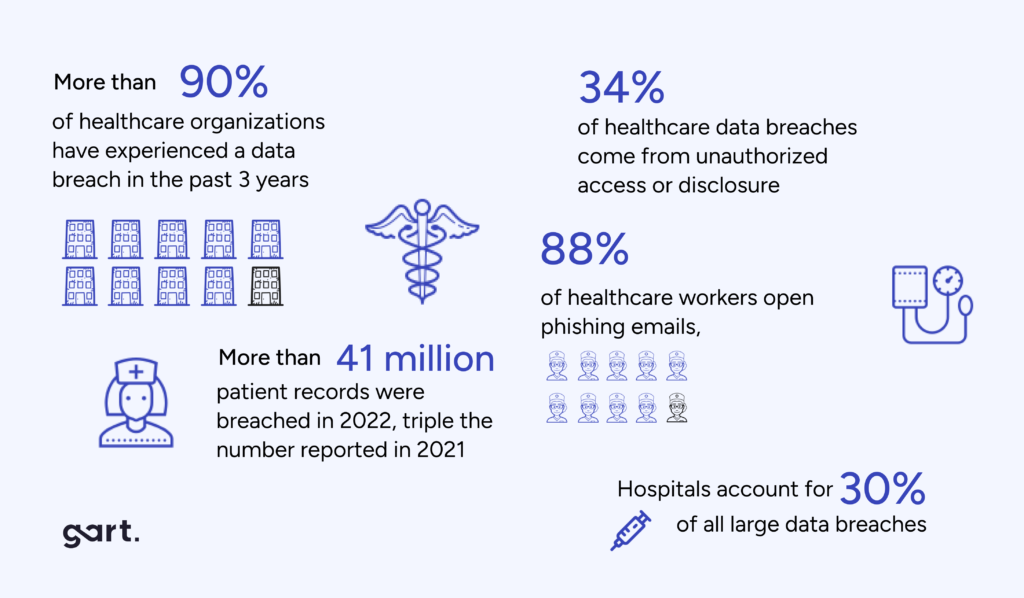
Utilize strong encryption algorithms to protect sensitive healthcare data when it is stored (at rest) and when it is transmitted (in transit). This ensures that even if unauthorized access occurs, the data remains unreadable and secure.
Additionally, implement data masking in non-production environments to protect patient data during development and testing, aligning with stringent healthcare data security requirements.
These methods allow for the realistic testing and development of applications without exposing actual patient data. Sensitive elements within the data are replaced with fictional or masked values, preserving data privacy and HIPAA compliance.
Zero Downtime
Healthcare services can’t afford downtime. DevOps should aim for zero-downtime deployments, using strategies like blue-green deployments or canary releases to minimize disruptions to patient care.
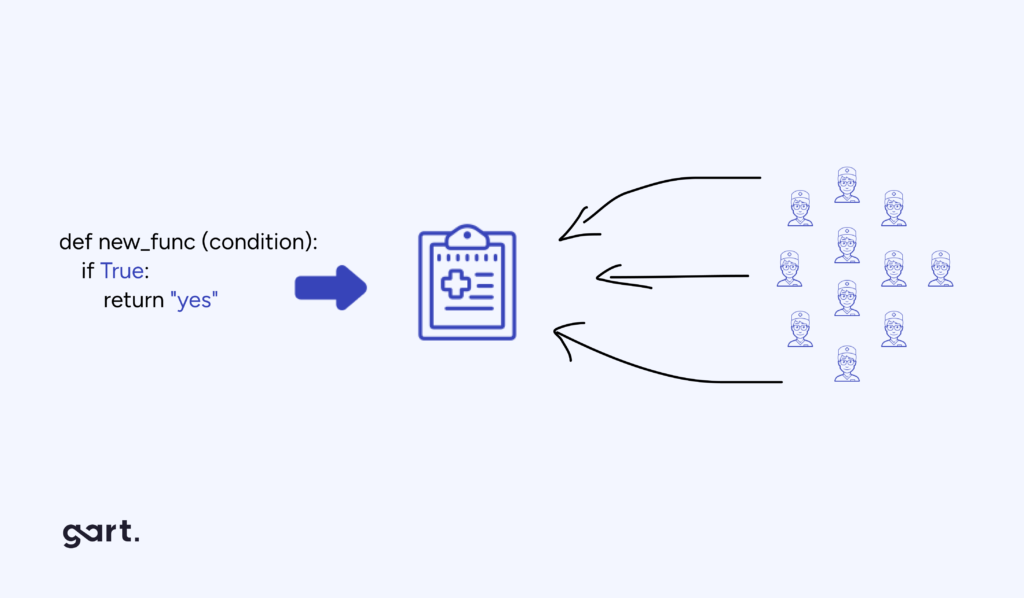
Disaster Recovery and Redundancy
In the healthcare sector, maintaining high availability is paramount. To safeguard against potential system failures, DevOps must incorporate robust disaster recovery and redundancy measures. These measures are crucial for ensuring uninterrupted operations and patient care, especially in the face of unforeseen disasters or critical system issues. Gart, known for its expertise in this area, offers specialized solutions for Backup & Disaster Recovery to bolster healthcare system resilience.
Change Management and Version Control
Strict change management and version control are essential in healthcare to track modifications, updates, and configurations. DevOps tools can help manage and document these changes effectively.
Collaboration with Clinical Teams
DevOps teams should collaborate closely with clinical professionals to understand their needs and feedback. This ensures that software aligns with clinical workflows and improves patient care.
Performance Monitoring
Implement robust performance monitoring to proactively identify and resolve issues before they impact patient care. Real-time monitoring of healthcare systems is crucial for maintaining service levels.
Regulated Data Retention and Backup
Data retention and backup policies need to comply with healthcare data retention regulations. DevOps practices should include automated data backup and secure storage management.
? Looking to streamline your operations, boost security, and scale effectively? Reach out to Gart’s DevOps specialists for a transformation. ? Contact Gart Today!
Cross-Functional Training
Encourage cross-functional training between IT staff and healthcare professionals to foster a deeper understanding of healthcare processes and IT requirements.
Non-Disruptive Updates
Develop strategies for non-disruptive software updates to minimize disruptions during critical patient care procedures. Implement rolling updates or feature flags to control new functionalities.
Serverless Agility
With a serverless architecture, healthcare companies are liberated from the burden of managing servers and infrastructure. Serverless platforms seamlessly adjust resource scaling according to demand, ensuring your SaaS application effortlessly adapts to varying user activity levels without the need for manual interventions. You focus on coding, while the cloud does the rest, significantly simplifying operations.
Incident Response Planning
Develop and regularly test incident response plans tailored to healthcare scenarios to ensure quick recovery in case of security breaches or system failures.
Containerization and Microservices
Utilize containerization and microservices to enhance scalability, portability, and resource efficiency, while maintaining healthcare application performance.
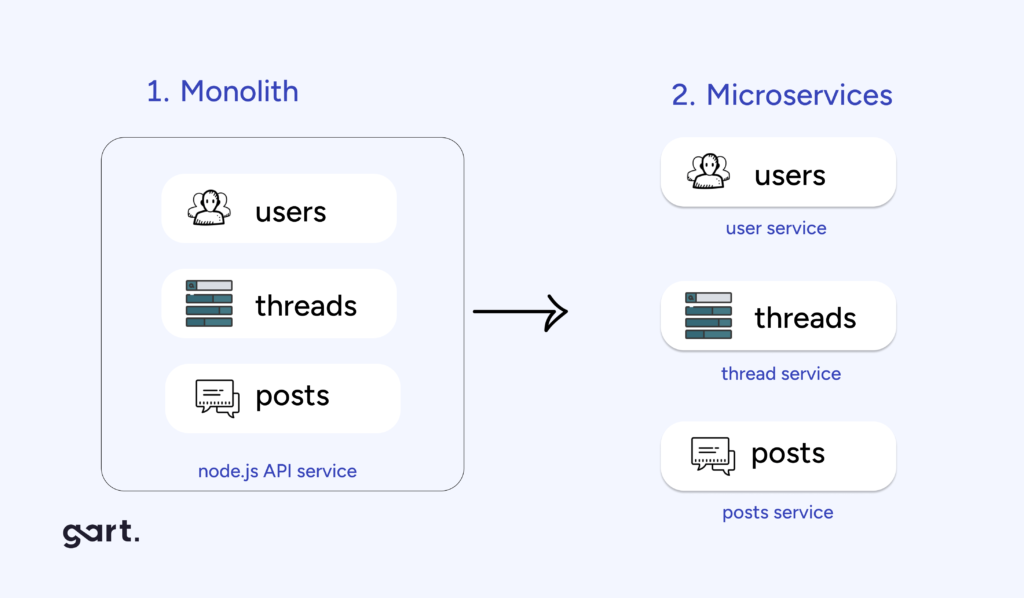
Secure Code Practices
Promote secure coding practices within DevOps teams to reduce vulnerabilities in healthcare software, where data security is of utmost importance.
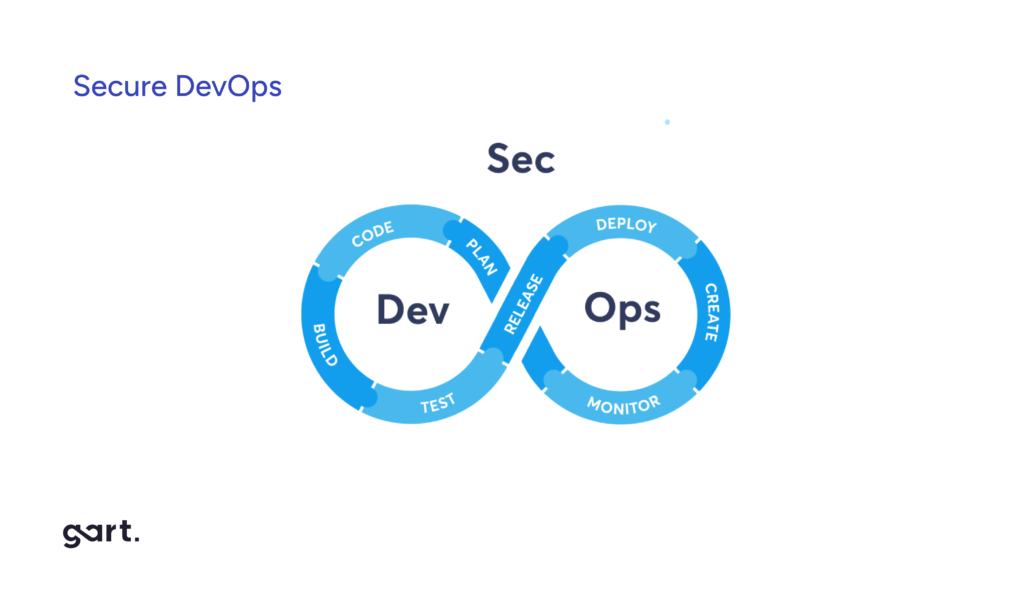
Comprehensive Documentation
Maintain comprehensive documentation for all DevOps processes and configurations, facilitating auditing and ensuring healthcare software integrity.
By integrating these healthcare-specific DevOps practices, healthcare organizations can enhance their ability to provide high-quality patient care while complying with regulatory standards and maintaining data security. These practices ensure that the benefits of DevOps are tailored to the unique demands of the healthcare industry.
DevOps in Healthcare: Best Practices
Automation
DevOps encourages automation across the entire software development and deployment lifecycle. This includes automating code testing, deployment, and monitoring. In healthcare, where patient safety and data security are paramount, automation reduces the risk of human error and enhances compliance with regulatory requirements.
Collaboration
DevOps fosters a culture of collaboration between development and operations teams. Healthcare organizations can benefit from improved communication, leading to faster issue resolution, more efficient deployments, and better overall patient care.
Continuous Integration and Continuous Deployment (CI/CD)
The CI/CD pipeline is a fundamental DevOps practice. It allows healthcare companies to make rapid and frequent software releases while maintaining high quality. This agility is crucial for adapting to changing healthcare needs.
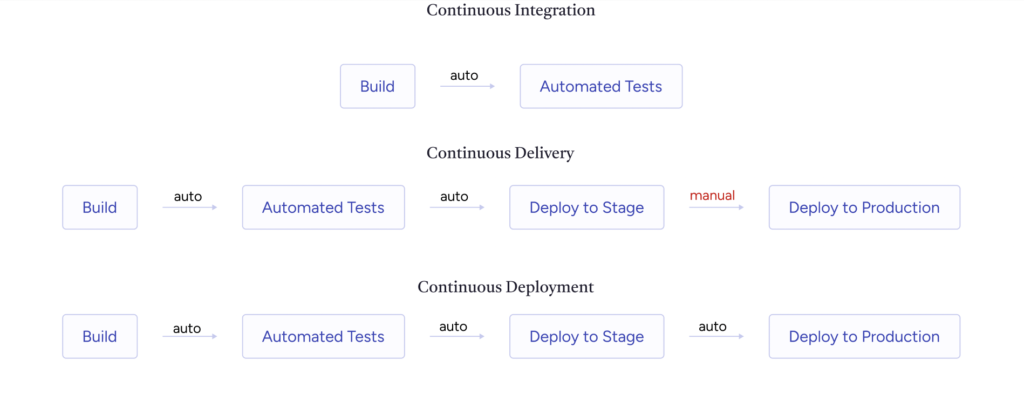
Security
The healthcare industry is a prime target for cyberattacks due to the sensitive nature of patient data. DevOps integrates security from the beginning of the development process, making it easier to identify and mitigate vulnerabilities. Regular security testing and automated compliance checks enhance data protection.
Monitoring and Feedback
Continuous monitoring and feedback loops in DevOps help healthcare organizations identify and address issues promptly. Real-time insights into system performance and user experience enable proactive problem-solving and ensure the highest level of patient care.
Benefits of DevOps in Healthcare
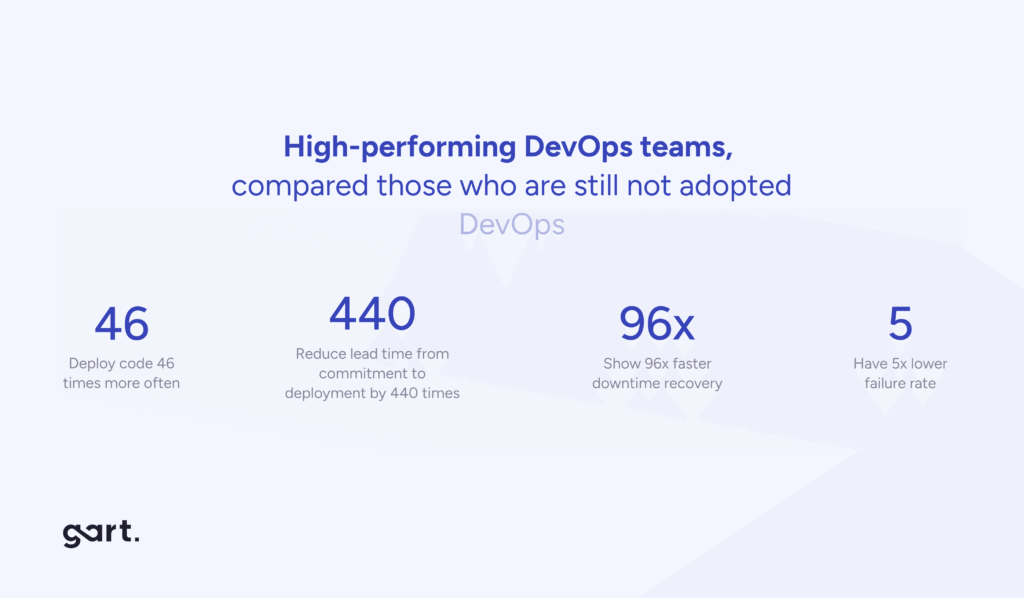
- Improved Patient Care: DevOps practices enhance the quality and reliability of healthcare software, contributing to improved patient care. Faster deployments and quicker issue resolution mean healthcare professionals can access critical tools without disruption.
- Cost Efficiency: Automation reduces manual intervention, resulting in cost savings. With healthcare costs continually under scrutiny, DevOps helps companies allocate resources more efficiently.
- Regulatory Compliance: DevOps streamlines compliance efforts by automating documentation and ensuring security and privacy requirements are met. This minimizes the risk of penalties associated with non-compliance.
- Faster Innovation: The ability to release new features and updates quickly enables healthcare companies to innovate in response to changing patient needs, market demands, and technological advancements.
- Data Security: DevOps best practices for security ensure that patient data remains confidential and protected. Timely detection and remediation of vulnerabilities help prevent data breaches.
- Enhanced Productivity: By automating time-consuming tasks and promoting collaboration, DevOps frees up resources and allows healthcare professionals to focus on patient care rather than IT issues.
Case Studies: E-Health DevOps Transformation
CI/CD Pipelines and Infrastructure for E-Health Platform
Explore how Gart Solutions transformed a healthcare development company’s Electronic Medical Records Software (EMRS) for a government E-Health platform and CRM systems. Gart implemented CI/CD pipelines and on-premises infrastructure, adhering to strict HIPAA and GDPR standards.
By leveraging local cloud provider GiGa Cloud’s hardware, utilizing VMWare ESXi and Terraform, and implementing data-masking techniques, they ensured secure and compliant data management.
Seamless Rails Application Migration: Transitioning from HealthCareBlocks to AWS with HIPAA Compliance
Gart orchestrated a smooth and comprehensive migration of a Ruby on Rails application from HealthCareBlocks to Amazon AWS. With meticulous attention to detail, Gart prioritized HIPAA compliance, safeguarded data integrity, and ensured the continued seamless operation of the application in its new cloud environment.
Healthcare SaaS: Cloud Engineer’s Journey in CI/CD, Terraform, and Cloud Migration
Gart took on the challenge at a high-growth healthcare SaaS company, where the task was to revamp CI/CD pipelines for both .NET and Node.js environments and implement Terraform infrastructure. Alongside these tasks, Gart orchestrated a smooth AWS to Azure migration. Gart’s impeccable work ensured PHI access compliance. Gart seamlessly interfaced with a US-based team.
? Are you seeking to streamline your operations, enhance security, and improve scalability? Transform operations and security with Gart’s DevOps experts. ? Contact Gart Today!
Conclusion
DevOps has rapidly become a key driver of efficiency, security, and innovation in the healthcare industry. By adopting DevOps best practices, healthcare companies can provide better patient care, reduce costs, meet regulatory requirements, and stay competitive in a rapidly evolving field. As the industry continues to evolve, embracing DevOps will be essential for healthcare organizations to thrive in an increasingly digital and data-driven world.









